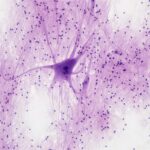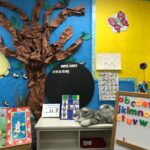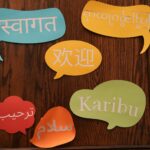Have you ever wondered how your brain manages to hold information in mind for a short period of time? For instance, when you read the Wi-Fi password off of a cafe’s menu board and have to hold onto it in... View Article
Tag Archive: language
A remarkable new study by Evelina Fedorenko’s research group, published in Nature Neuroscience, showed that brain regions associated with language processing in native English speakers were also activated in speakers of 45 other different languages, while they were engaging in... View Article
Results from the latest Education Quality and Accountability Office (EQAO) reading assessment have indicated that a quarter of Ontario’s grade 3 students are failing to meet reading standards for their age group. Erin Panda, an assistant professor in the Department... View Article
We are living in an era where biomedical research has advanced exponentially – to the extent of being able to roll out and distribute a vaccine to millions within just months of the declaration of a pandemic. As scientists gather... View Article
Emily Moorhead is a kindergarten teacher whose son in grade 1 was exhibiting early signs of dyslexia, a type of learning disability. Even as an elementary school educator, she still felt that she didn’t have the skills to help her... View Article
A research study authored by psychology professor Ellen Bialystok and colleagues from York University sought to determine whether language learning was effective at boosting cognitive health among older adults. Participants between 65-75 years old, all of whom were monolingual English... View Article
Librarians play an important role in supporting individuals in learning how to access research databases and to become more literate in digital media. Yet according to recent statistics published by Antioch University Seattle in the School Librarian Investigation Decline of... View Article
Is learning to code more like learning a new language or learning to solve mathematical problems? This study highlighted in this article explores this question. As with human languages, coding involves learning new terms and symbols. To become fluent, you... View Article
This article provides some tips on how to keep the brain active throughout life. Since the brain is arguably the most important organ, one is advised to partake in physical activity and to stay fit and in shape, even as... View Article
A large focus of Alzheimer’s disease (AD) research is identifying early intervention strategies to decrease the risk and early onset of the disease. To test these strategies, the populations involved must benefit from the research. Many variables that are linked... View Article
An opinion piece in the Globe and Mail stated that 25% of children who finish grade 3 are set up for failure in grade 4. Their reading and writing levels are well below the minimum level necessary to succeed further... View Article
Two decades ago, British linguist Richard Hudson defined hyperpolyglots as people who are fluent in at least 11 languages. Hyperpolyglots are rare but have existed for centuries, and neuroscientists are trying to understand the nuances that set them apart from... View Article
Cognitive scientists have known for several years that adults have a harder time learning a new language than children. However, it has never been clear just when this change occurs, and how long this “critical period” lasts. Researchers at MIT... View Article
A study conducted in 1995 discovered that children from higher income families tend to hear about 30 million more words in their first three years of life in comparison to children from lower-income families. It was concluded that the significant... View Article
Photo by zhendong wang on Unsplash. The world is full of roughly 6,500 languages, but most Americans are only taught one or two – why is that? We know that learning more than one language lowers the likelihood of developing... View Article
John Guttag and a team of researchers from MIT and Massachusetts General Hospital’s Institute of Health Professions have developed an automated computer system that helps in diagnosing speech and language disorders in children. If diagnosed at a young enough age... View Article
Finn et al. (2014 PLoS One) find evidence that the more “effortful” language learning of adults vs. children interferes with their learning of an artificial language (consisting of two-syllable, three-category nonsense words). In particular, adult learners under given instructions to... View Article
In an article in The Chronicle of Higher Education, author Steve Kolowich describes the satirical creation of the Babel (Basic Automatic B.S. Essay Language) Generator, by Les Perelman and his students at MIT. The software generates essays prompted only with... View Article

















